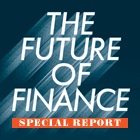This content is from:Portfolio
J。基于Agent的Doyne-Farmer模型
The Oxford academic and Los Alamos alum says the insights of classical and behavioral finance can be much refined by using computers to simulate how real people act — and interact — when making economic decisions.


Finance theory continues to develop beyond the traditional academic precincts of rational expectations and efficient markets, with the latest innovations来自心理学、神经科学和生物学.
J。多因·法默is making his mark by thinking outside the box as well. Farmer is a professor of mathematics at the University of Oxford and a director of the program on complexity economics at the Institute for New Economic Thinking. Additionally, he is an external professor at the Santa Fe Institute, a private, nonprofit research organization. But Farmer was originally trained as a physicist. In the 1980s he worked at the Los Alamos National Laboratory, home of the Manhattan Project, where scientific luminaries like J. Robert Oppenheimer and Richard Feynman once plied their trade. At Los Alamos Farmer founded the Complex Systems Group in the theoretical division.
In 1991, he co-founded the Prediction Company, a quantitative trading firm about which University of Chicago professor and architect of the Efficient Market Hypothesis Eugene Fama said: “Prediction Company’s chance of success is not zero, but close to it.” The firm would prove Fama wrong, however, and was purchased by Swiss banking giant UBS in 2005.
At the Santa Fe Institute, Farmer is looking for laws in financial markets that can help explain what drives the stability and performance of the banking system.
在他的职业生涯中,Farmer与麻省理工学院斯隆管理学院金融学教授Andrew Lo(他的适应性市场假说试图通过进化生物学的应用使Fama的假说与人类行为的现实相协调)和耶鲁大学经济学教授John合作他是经济学一般均衡分支的著名贡献者。
目前,Farmer正在研究一种理解市场行为的不同方法:基于代理的建模——投资者参与金融市场的模拟。
This work requires gathering and coding an enormous amount of data and creating a library of information of sorts from which to simulate interactions of agents in financial markets. Farmer’s background in dynamical systems theory, time-series prediction and chaos theory coupled with his newer work with complex systems and financial economics has aided him in his effort to simulate and analyze the individual actions of and interactions between agents on a marketwide basis.
Farmer还是危机的科学协调人,这是欧盟的一个大型项目,旨在构建基于代理的银行体系和实体经济模型。
亚博赞助欧冠Reporter Ben Baris spoke with Farmer about his work and agent-based modeling.
亚博赞助欧冠:你被训练成物理学家。你是怎么来研究金融市场的?
Farmer: The basic principles of how you make a good model are not that different in economics or biology. Time-series forecasting gave me a lot of exposure to real-world problems in a lot of different domains, so it means I know a little about a lot.
What is the problem with the way most economists approach finance?
They are still very closed to any way of thinking abouttheories for the economythat don’t satisfy the straitjacket of the neoclassical approach. A lot of things need to be brought in from outside economics — ironically, a lot of things from physics. Physics is a very empirical field, where any crazy idea can be proposed, and if it works, it will get respect; whereas in economics, there’s a view that all theories have to come from a certain set of basic postulates. If your theory isn’t about individuals selfishly maximizing their preferences, then its not even considered a theory in economics. I think an awful lot of what happens in the economy doesn’t have anything to do with individuals selfishly maximizing their preferences.
假设这是复杂的systems come into play, can you explain what they are and how they work?
我们称之为复杂的系统 - 大脑,社会,免疫系统,生态系统 - 由许多互相互动的小部分组成。使复杂系统成为一个关键的东西是它显示出于组件本身的行为不明显的紧急行为。一个神经元可能在某种意义上是一系列复杂的系统,而是真正了解大脑如何工作,你必须真正了解当你有数十亿个相互作用的神经元时会发生什么,并且必须了解那些相互作用的神经元的紧急性质。
同样地,复杂系统在思考经济活动时也是相关的,因为它是所有参与者相互作用的一个紧急属性。
关于复杂系统的第二件事是,作为一门学科,它相信复杂系统有共同的特性,它们在非常不同的领域表现出来。所以也许经济学家可以从听神经学家的演讲中学到一些东西,我说的不仅仅是那些试图理解交易者是如何紧张的人,而是从思考大脑是如何自我组织的。也许这能告诉我们经济是如何自我组织的。
But what is there to learn if markets are efficient?
我认为“高效市场”是一个微妙的问题,双方误解了。我的方式,我的方式是市场一直是效率的效率,并且在二阶效率低下,而且背后的想法一直返回[指出芝加哥大学经济学家]米尔顿弗里德曼。
或许换个角度来说,如果有灌篮式的投资策略,每个人都会蜂拥而至,然后消失。结果是一个也没有。有一些策略涉及思维和处理、技能、直觉、努力工作、数据收集、计算机处理。这不是自由货币战胜市场。
金融业所犯的错误只是着眼于第一顺序,而几乎忽略了这样一个问题:谁是那些利用这些低效率的投资者,以及这种博弈的性质如何影响市场的行为方式,因为市场确实与偏离效率有关。
那么,怎样才能使市场有效呢?
在金融领域,你必须区分信息效率(盈利和套利)和配置效率;也就是说,市场公平吗,是不是创造了尽可能多的公益?这方面效率很低,但另一方面效率相当高。在一般均衡理论下,这两者是相同的,但那是在一大堆完全不切实际的假设下。
Successes are out there, and I think they illustrate this paradox because while firms make a lot of money, they do so typically in a situation where the statistical fluctuations are still significant, or they, in modern times, do something like high frequency trading where they have to put a really big investment and a lot of serious effort into computer infrastructure.
What do you think about the work done by the behavioral finance field?
我完全同意他们所做的一切,指出问题所在,但我认为他们仍在努力理解如何解决问题。问题是他们提出的理论与人们理性预期的理论过于接近。
很多经济学是由结构而不是战略驱动的。如果你想思考一本限价指令书,那么重要的是要思考限价指令书是如何建立起来的,而不是想象你有一个理性的存在与之互动。问题是理性很难理解一个理性的人会做什么。另一方面,如果你去看看人们真正在做什么,你可以制作模拟真实世界的模拟模型。这是基于代理的模型的主要特点之一——我们认为基于代理的模型是行为主义的天然伙伴,要使[行为主义]成为一种实证理论,行为主义者需要完全改变他们建立模型的方法,利用你拥有的自由,一旦你可以将行为封装成一个计算机算法,并利用一群具有不同行为的代理来模拟他们的交互。
